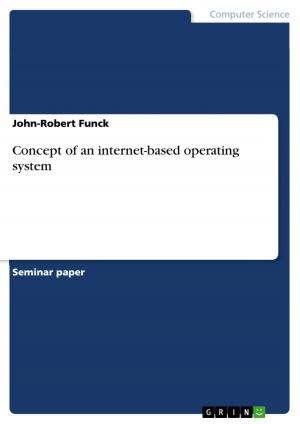'Freie Bahn dem Marshallplan'?
The West German reaction to the european recovery program 1947-1952
Nonfiction, Social & Cultural Studies, Political Science| Author: | Franziska Gerhardt | ISBN: | 9783638031714 |
| Publisher: | GRIN Publishing | Publication: | April 4, 2008 |
| Imprint: | GRIN Publishing | Language: | English |
| Author: | Franziska Gerhardt |
| ISBN: | 9783638031714 |
| Publisher: | GRIN Publishing |
| Publication: | April 4, 2008 |
| Imprint: | GRIN Publishing |
| Language: | English |
Seminar paper from the year 2004 in the subject Politics - International Politics - Region: Western Europe, grade: 1,0, Humboldt-University of Berlin (Institut für Sozialwissenschaften), course: Die USA und die Modernisierung Europas, 17 entries in the bibliography, language: English, abstract: On 5 June 1947, the US-Secretary of State, George C. Marshall, in his later famous speech at Harvard University proposed a reconstruction program for Europe. Ten months later, on 2 April 1948, the Foreign Aid Act was passed by the US Congress. Thus, the European Recovery Program (ERP), more commonly called the 'Marshall Plan', came into effect. It was the biggest ever project of international economic cooperation in times of peace. Between 1948 and 1952, the goods and services provided for Europe by the U.S. amounted to 13 billion dollars . Sixteen European nations took part in the program, and West Germany, after Great Britain, France, and Italy, was the fourth biggest receiver of American support . This money played a crucial role in creating the West German 'Wirtschaftswunder' and integrating the country into the West. Much has been written about the Marshall Plan, also from a German perspective. Its development, the institutions organising it and its consequences have all been described in detail by political scientists and historians alike. This paper sets a different focus and concentrates on the West German reception of the Marshall Plan. How did the West Germans react to the European Recovery Program, only three years after their ultimate defeat, with their economy destroyed, their cities bombed to rubble and their collective conscience having by no means confronted the guilt of Fascism? Was it really all 'Freie Bahn dem Marshallplan '? Up to now, this very aspect has been nearly unexplored, so there is not much literature about it. In any case, I have tried to base my essay on as many sources as possible to be able to offer a balanced analysis, my main sources for the German perspective being the books and articles by Berghahn, Foschepoth, Pommerin, and Wagner . The essay is structured in such a way that, after a brief introduction to the subject, the German reception of the Marshall Plan will be overviewed in three different areas: The reactions in the press, the reactions in the opinion surveys that were conducted by the American occupation forces from 1946 onwards, and finally the viewpoints of the political parties. Subsequently, an attempt to explain the German reception will be provided by taking a closer look at the situation in Germany before the Marshall Plan and by analysing the different German fears and concerns about American economic policy, before coming to a conclusion. The time frame of the essay spans from 1947 to 1952.
Seminar paper from the year 2004 in the subject Politics - International Politics - Region: Western Europe, grade: 1,0, Humboldt-University of Berlin (Institut für Sozialwissenschaften), course: Die USA und die Modernisierung Europas, 17 entries in the bibliography, language: English, abstract: On 5 June 1947, the US-Secretary of State, George C. Marshall, in his later famous speech at Harvard University proposed a reconstruction program for Europe. Ten months later, on 2 April 1948, the Foreign Aid Act was passed by the US Congress. Thus, the European Recovery Program (ERP), more commonly called the 'Marshall Plan', came into effect. It was the biggest ever project of international economic cooperation in times of peace. Between 1948 and 1952, the goods and services provided for Europe by the U.S. amounted to 13 billion dollars . Sixteen European nations took part in the program, and West Germany, after Great Britain, France, and Italy, was the fourth biggest receiver of American support . This money played a crucial role in creating the West German 'Wirtschaftswunder' and integrating the country into the West. Much has been written about the Marshall Plan, also from a German perspective. Its development, the institutions organising it and its consequences have all been described in detail by political scientists and historians alike. This paper sets a different focus and concentrates on the West German reception of the Marshall Plan. How did the West Germans react to the European Recovery Program, only three years after their ultimate defeat, with their economy destroyed, their cities bombed to rubble and their collective conscience having by no means confronted the guilt of Fascism? Was it really all 'Freie Bahn dem Marshallplan '? Up to now, this very aspect has been nearly unexplored, so there is not much literature about it. In any case, I have tried to base my essay on as many sources as possible to be able to offer a balanced analysis, my main sources for the German perspective being the books and articles by Berghahn, Foschepoth, Pommerin, and Wagner . The essay is structured in such a way that, after a brief introduction to the subject, the German reception of the Marshall Plan will be overviewed in three different areas: The reactions in the press, the reactions in the opinion surveys that were conducted by the American occupation forces from 1946 onwards, and finally the viewpoints of the political parties. Subsequently, an attempt to explain the German reception will be provided by taking a closer look at the situation in Germany before the Marshall Plan and by analysing the different German fears and concerns about American economic policy, before coming to a conclusion. The time frame of the essay spans from 1947 to 1952.















